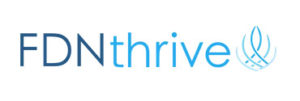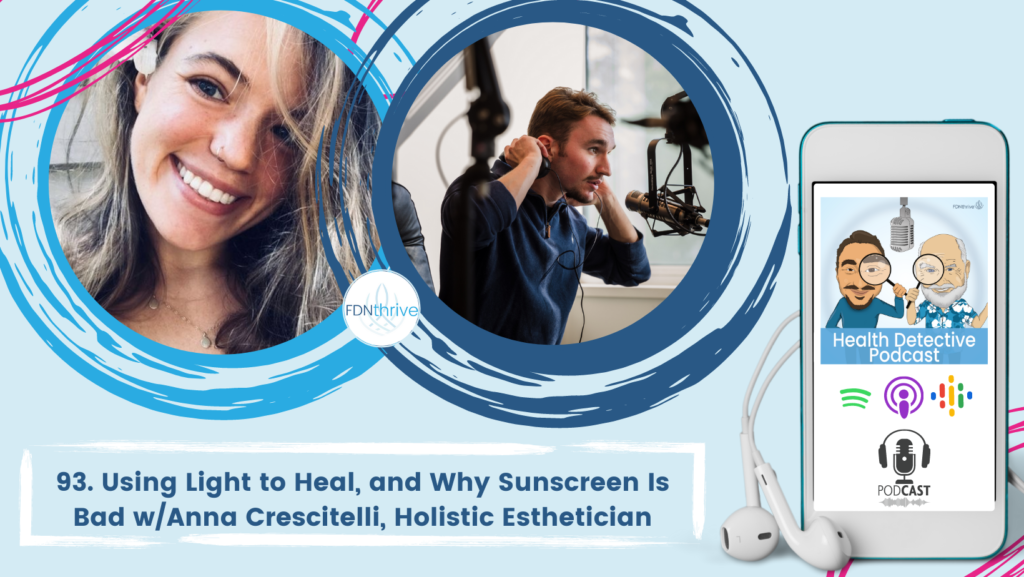
Introduction
Hello, my friends. Welcome back to another episode of the Health Detective podcast by FDNthrive. My name is Evan Transue, AKA, Detective Ev, and I will be your host for today’s show. We have a bit of an interesting one here because we are doing the first ever live and in-person episode of the Health Detective podcast.
I am really fortunate to have some amazing holistic and functional practitioners that are in my local area and I wanted to make sure to eventually get at least a few of them on.
Anna’s Background
Today we’re going to talk to my friend, Anna, who is a holistic aesthetician. She’s someone who has a background in herbalism, macrobiotics.

She graduated from the Institute of Integrative Nutrition at 18. It was so cool to have met her because we met after the age of 18. I went through IIN really young as well. We hit it off on that for sure. But Anne was someone who found this completely on her own. Her mom is, as Anne describes, a total hippie.
Her mom was always into the organic food and really doing things from a natural perspective. Her and her sisters and her brother were homeschooled she was always a very independent thinker, kind of doing her own thing. That’s how she got into this stuff. She knows a lot more than the average person, especially given the age. She knows incredibly more than the average twenty-something.
Welcome to the Podcast
[00:08:43] Evan: All right. Well, hello there, Ann. Welcome to the Health Detective podcast by FDNthrive. How the heck are ya?
[00:08:48] Anna: I’m good. How are you? I’m excited to be here.
[00:08:50] Evan: I’m very excited as well. For those listening, you might be like, wow, that quality sounded pretty good. It is because we are privileged enough to be doing the first live episode of the Health Detective podcast. I don’t mean live in the sense of that these interviews aren’t always live.
They are, but we’re grabbing people from California. We’re grabbing people from the UK. We have people all around the world, but this is actually a local friend of mine who is very well-versed in health stuff. Especially what we’re going to talk about today with kind of light and how it relates to multiple things.
It’s not necessarily going to be an interview per se. It’s more going to be a conversational thing, going back and forth. I think that’s going to be super fun. What do you think?
[00:09:28] Anna: I think we always have fun, so I’m ready.
Anna’s Health Background
[00:09:48]Evan: I want to talk a little bit about your health background. I think that makes sense to get this thing started.
The audience heard in the bio, some of the cool stuff that you’ve done. Ann and I met; it was so funny because we were both really young. We are kind of in a niche thing. A lot of you guys have heard of the Institute for Integrative Nutrition. I know that’s super common in our world and we had both went there. I mean, what, prior to the age of 21 or 22,
[00:10:12] Anna: I think. I was about, I would say, 18 going into 19. I started doing that.
[00:10:18] Evan: Nice. You found that on your own?
Anna: Yeah.

Evan: That’s that homeschool life, man. There’s so many people on here that would appreciate that. You have a homeschooled person that actually thinks for themselves and finds their own passions. Interesting. Cool. What even drew you into health to begin with? How did you get into that?
[00:10:34] Anna: I definitely would say I’ve always been interested in health since I was a little kid. I’ve always been a very nature girl. I’m very into making my own products and stuff. That probably started when I was, I would say maybe 10. I was really getting into stuff like that, but I was kind of, well, I mean, I grew up, my mom was a hippie. She was really into organic food and really healthy lifestyle for kids and all of that. I think I just grew up in a household that really loved things like that and they really promoted that as a really good lifestyle.
So then in general, I’m a bookworm, I love reading. I would just read and read and read about anything I could really get my hands on and especially natural health and wellness and anything to do with beauty routines and things like that. Really enjoyed that.

[00:11:22] Evan: It’s always interesting to find the influences that led people to this because I think you have a mix of both. The most common one I hear actually is not a family influence or a friend influence. It’s an intuition more or less. It’s this gut feeling that what they’re being told by their doctor or whatever doesn’t make sense. I know that you’ve certainly dealt with your own health challenges where this is a little different than most people that come on is. I mean, we have people that’s some serious stuff. It’s cancer. Sometimes it’s 10 years, 15 years of auto-immunity. Thankfully, you never had to deal with anything like that, but I know that you had your own health challenges that we kind of share.
What were some of the things that even though you were doing all this stuff, mom’s a hippie, you’re eating organic, what were some of the health complaints that maybe came up when you were younger?
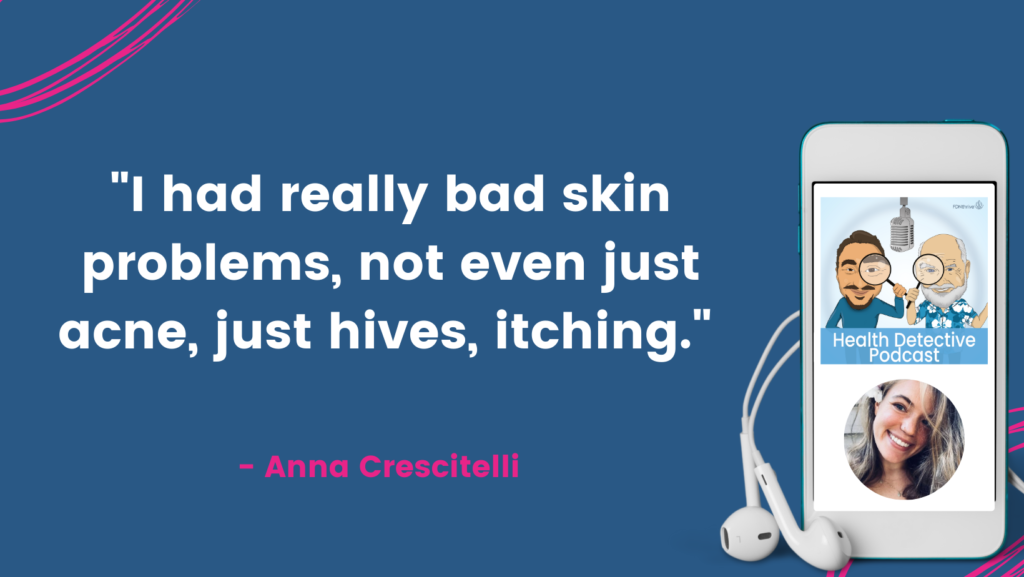
[00:12:02] Anna: I would definitely say the most memorable thing in, I guess you’d call it my journey of health and all of that is I had really bad skin problems, not even just acne, just hives, itching.
I don’t know. It never was as bad as just the acne portion of it, but then also struggling with scarring and you feel, it sounds so silly, but you feel so depressed when your skin, especially when, I was what, teenager. My skin probably started getting really bad when I was about 18.

So, you’re technically still a teenager and all my friends had perfectly clear skin. I mean, a lot of people would go on the pill and stuff and clears everything up and I wasn’t allowed to be on that. I kind of had to start looking for other alternatives and dealing with it. That’s how I really got into the details of reading on everything I could to possibly heal my skin because nothing was working and it was driving me insane.
And I’m sure anybody else who struggled with that, I mean, you struggled with that. You know how frustrating that is.
[00:13:04] Evan: Yeah. I think it’s so weird because we can do a whole podcast on that alone. Because it’s one of those things where, and this is true with any of these chronic diseases or cancers or things that people come on with.
There is the general empathy that can be had from just dealing with a chronic issue. But then there’s the specific empathy. Let’s say you have, I don’t know, prostate cancer. You’re not going to be knowing about the idea of checking the mirror a hundred times a day only to see the exact same things that you’ve already seen the other 99 times, right. It’s obsessive. It becomes obsessive and it’s so obvious to everyone. That’s the thing. You never get a psychological break because at all times, if you’re interacting with people, you don’t want to do that. I have to be conscious to this day still because people know my story on here.
I’ve shared it many times even in a solo episode type of thing, but one of the things with skin stuff is like, that’s my weak link in the chain. The way I approach things, if I screw up really bad or I do something stupid, I can get a breakout. I’ve had to learn to really separate the idea of one or two breakouts from the devastation I was having when I was a kid.
I did the little sauna thing recently. I probably did not do this right because I’m trying to detox. But my skin though, I have to approach a sauna differently than most people, I think. Because what it did was immediately accumulate stuff under the skin and it created rather large things.
My mind wants to go back in the past, “Oh my God, I can’t go out. I can’t do anything right now.” It’s like, dude, you have two breakouts, bro. You’re good. That’s the majority of America.
[00:14:30] Anna: Also, it is hard once that you have your skin under control, I should say, or you’ve shifted it to a place where it is healthy and you aren’t getting breakouts and you feel really good about the way your face looks.
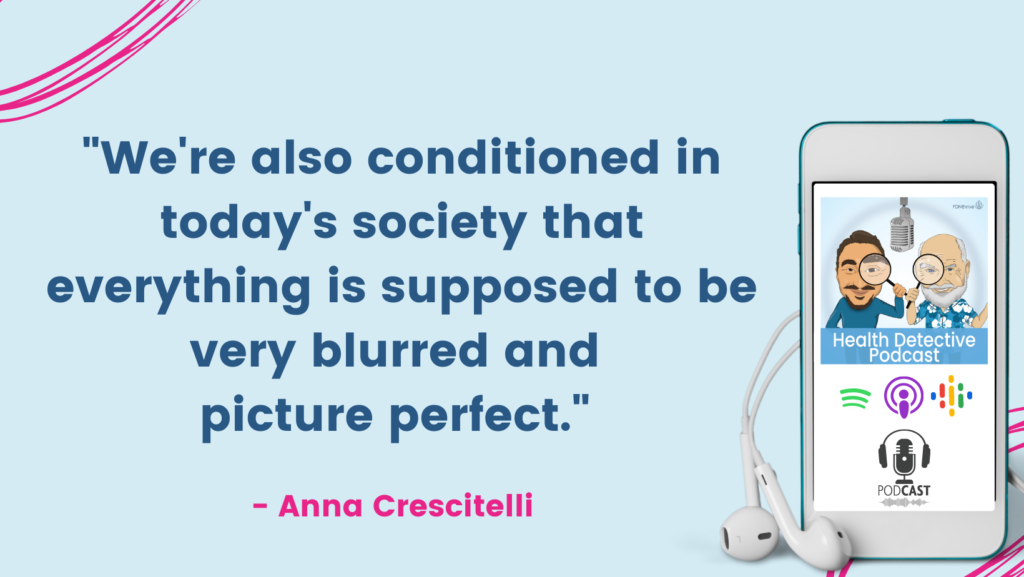
You almost take it to that detrimental place where you’re like, “Oh my God, my face looks terrible.” And it doesn’t, but we’re also conditioned in today’s society that everything is supposed to be very blurred and picture perfect and look a very specific way. It’s the beauty standard stuff.
I just think that in general, you’re taught to pick and kind of poke at yourself and see where all your little flaws are even though it’s the tiniest little thing. It doesn’t even matter.
[00:15:06] Evan: It’s all fake. I always say social media, I do this with the kids in the schools and stuff.
I say it’s a highlight reel of our lives that isn’t even real because we edit it to look a little better than it actually is and none of us are going to post the bad stuff. It’s remarkable how sometimes you finally – I mean, you do this too – pretty connected on social. I’ve met many people through social media actually, and this isn’t to condemn them at all.
We all do this. But you think they’re just like, wow, 10 out of 10 person, and then you meet them. You’re like, you’re imperfect as well. There’s not that many perfect people running around. There’s the very few rare specimens, men and female, that we’re totally jealous of. But they’re like one in a million, so that’s good news for the rest of us.

[00:15:45] Anna: Well, yeah, but even those people, you can take celebrities as a perfect example. Even back before we had social media and stuff, you would look at them and then you see a paparazzi picture of them and they just looked completely different. But it’s so helpful because you think, I know that this person is just human, just like me.
And they have the same things. It is kind of funny cause I’m an esthetician. People will come to me and they’ll want these kind of new-age type things. I work at a spa that’s very, it’s kind of like a heal with your hands type idea. We don’t use a lot of crazy new found gadgets and treatments and things, which is fine.

But a lot of people will come in and be like, can you get rid of all my wrinkles in one session? I’m like, “Well, no.” But we can do things that can heal the skin holistically in a way that you will see a difference. But I think now everything is all about just kind of quickness and instant gratification.
[00:16:38] Evan: That’s so true, especially with the skin. Listen, if you’re trying to pursue healing this naturally, which I think is a very worthy ideal, you’re in this for the long run. It’s not going to happen in a month. Honestly, the only way I do know this, and I’m not suggesting this, it’s not medical advice, if someone did an extended fast – water fast – for seven to 10 days, I’ve heard things in the forums.

I’ve seen people document it. No, it does work because you’re getting yourself into such a deep state of autophagy. It will, after day three or four, start going after the cyst. It’s going to start going after that stuff. Yeah, you do that for seven to 10 days, you could make a radical change in someone’s skin by doing that.
But that’s just so impractical for most. I mean, who the heck is going to do that? And again, I’m certainly not advising anyone to do that. That can be dangerous depending on your metabolic health and how you reimplement food after you do a seven to 10 day fast. You gotta be careful. Again, most people would take a few pimples over doing that.
[00:17:28] Anna: Well, and it’s definitely a balance of both. I think we live in the age of today, especially that I see being an aesthetician, especially with skincare in general, just plain old skincare, that has completely changed even since I was younger. I would say probably even in 10 years, the way that the skincare community has changed so much, it’s insane.
I’ve even seen people come in and they tell me what they do to their face. I’m just like, oh my God, your skin is so smart and your body’s smart. A lot of times it’s a balance of external and internal factors. A lot of times people are just slathering stuff on their faces and not making it any better because they’re not addressing, what are you eating? Are you sleeping? Are you depressed? Are you struggling with anxiety? Like, are you eating organic things like that? A lot of times people don’t even ask those questions. They’re just going to the store and buying whatever TikTok or Instagram’s telling them to buy. It’s true.

It’s kind of scary. I’ve seen some of the trends and stuff that people are doing. I don’t know what’s going on. I mean, I went to school for seven months to be an aesthetician. Even then you’re not allowed to give nutritional advice or anything like that, but so much of what happens on the face is internal. And it goes back to your food, especially, a lot of it and emotion.
[00:18:48] Evan: I think those anecdotal experiences with the seven-to-10-day water fasts, almost prove that, to some degree, it could be argued that it’s inherently internal. Because if I have the worst case and I go out and do that, and it works every time and, I again, I’ve seen people do this.
They didn’t even do water fast. Technically they actually had some food with it and bam, completely clears them up. Was this ever an external problem then? Or was it purely internal? Now I’m not saying throw a bunch of oil on your face and have that happen. But I think you would probably be able to speak on this better.
Anyway, I feel like there’s certain genetic factors, which are not fates, they’re not ultimatums. But I feel like even just the skin turnover or cell turnover, I’ve heard about certain things with that on the face. Because again, when I go to the sauna, some people that’d be an amazing thing for their acne even if they didn’t go home and shower for an hour, they still help them out. For me, it just immediately accumulates. I gotta probably go out and literally walk to the shower in the gym the second I’m done.
What do you think? Is there truth behind that? What do you think about that with the cell turnover thing? Are you familiar with what I’m talking?
[00:19:52] Anna: Yeah. You just mean, certain experiences and certain climates almost can bring out different things in your skin as well, like with the sauna. I mean, I have an experience, a personal example, I should say of, I used to work out and lift and do hiit workouts, all the time.
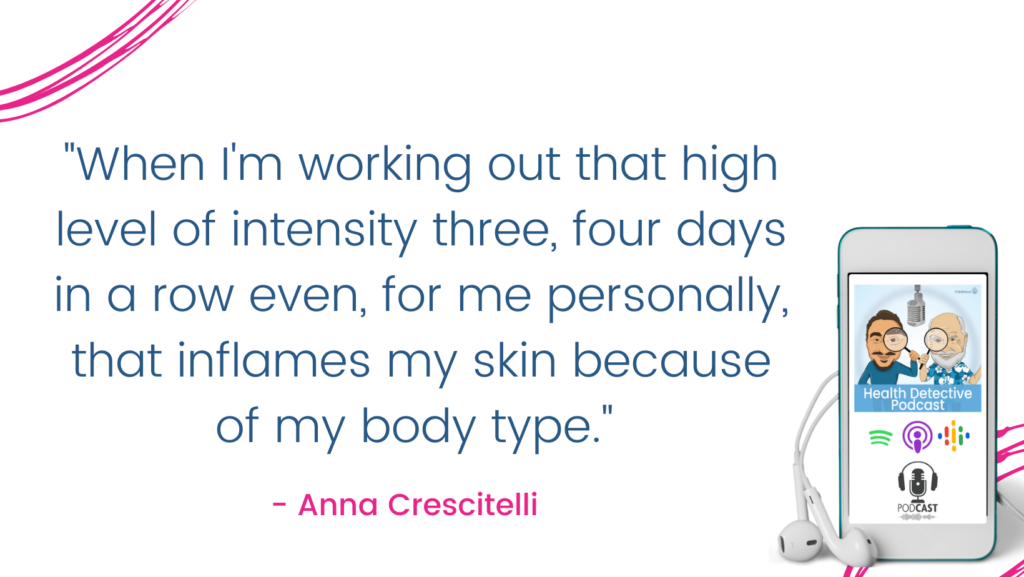
And I would get these programs and this girl would do hiit workouts, five days in a row. I’m going to do that because she’s really in shape and blah, blah. But to me when I’m working out that high level of intensity three, four days in a row even, for me personally, that inflames my skin because of my body type and my constitution and however I’m made up. I do better with low impact exercises, like walking and yoga and very relaxing things for myself. That, every once in a while, is fine. But for me, I’ve even noticed the same thing. If I’m bringing a lot of heat into my body, whether that’s from really being in high heat for a long time and sweating, or doing a different type of workout, that definitely is something that I see a lot of people.
I always tell clients, if they’re like, I go to the gym every day and I’m struggling with wrinkles and breakouts. I’m like, well, first of all, if you are going to the gym every day and you’re underweight – a lot of women, they’re underweight because they work out so much, naturally, your skin will sag.
You don’t have any muscle tone or fat to boost the skin. That’s one thing I do tell people. It’s hard to say that to somebody. I do tell people like, hey, if you’re working out a lot, you’re not going to have as much volume in your face because if you are older and you’ve lost that elastin and collagen naturally, then when you don’t have any excess weight on top of that, that can cause sagging.

And it’s the same thing with acne. If you’re really active and your metabolism’s going, and you’re not eating enough, and you’re bringing all this heat into your body, you can also get rashes and breakouts from working out. It’s literally, it’s so crazy that there’s so many different ways to look at the skin and people don’t even think about it.
I had to do that for myself. I had to think, working out is good for you, but that type of working out for me, at that amount of time every day, “No Bueno.” It was not good.
[00:22:06] Evan: First of all, that’s great insight. Thank you. I would never condemn someone for using these harsh cleansers even, because they’re trying to get relief. That’s why I wouldn’t condemn it. But it’s when we start getting into this crazy stuff too and no other options ever been considered. We’re talking Accutane, we’re talking about months of antibiotics on and I’m like, oh my goodness. There’s such an irony with some of this stuff. The fact that the antibiotics are even working for your acne to some degree, doesn’t that tell you that it’s a little more than, is it solisic acid?
Anna: Salicylic acid.
Evan: Salicylic acid. See how funny is that? And I’m not making a joke out of it. I’m being serious. I’m a kid, or I was a kid, who used that probably for 10 years straight. I can’t even pronounce the ingredient. That wasn’t just like me messing up. I literally didn’t know that’s what it was called and that’s what we’re doing now. It’s completely not thinking about the problem. I don’t think it’s a deficiency in that thing. I don’t think it’s a deficiency in that. I think there’s something more going on. I knew you and I would have to do a part two of this. This is already just stack it up.
Light, Skin, and Sunscreen
And I’d love to start with you if you want to with this, because light is a topic, I’m super passionate about. I’m low key, definitely known in my local circle, for sure, as always doing the stuff with light, whether it’s the mid-summer sunshine vitamin D being very calculated with that. Certainly sunrise.
Light in the skin. What do you know about it? How does it work? And I think this is really important coming from someone with your credentials and knowing what you’re talking about with this.
[00:24:15] Anna: We can actually tie it in with what you were talking about with harsh cleansers and products. It’s hard because as an aesthetician, especially in school, you’re taught about the importance of SPF. I really hate the way that sunscreen is marketed towards people, especially young women, especially women in general. They do it in a way where they’re like, if you do not wear sunscreen, you are going to literally look like a wrinkled old raisin that is so undesirable and awful. I just think it’s terrible.
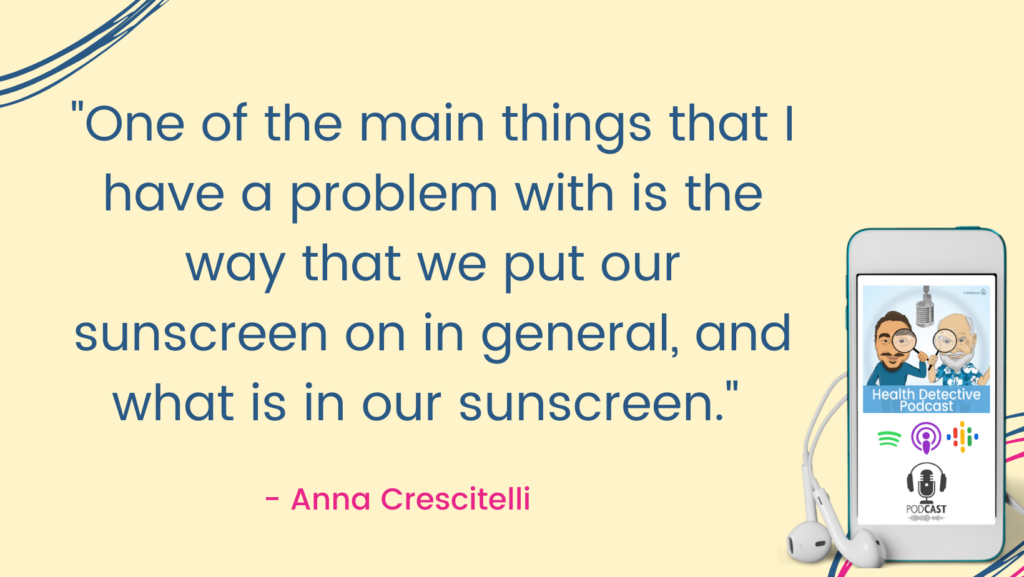
It also blocks our vitamin D. They’re actually seeing such a significant decrease in vitamin D in a lot of adults nowadays, as you know, one side of it has to do with our society and the beauty industry and how they actually scare people. I hate to say a lot of dermatologists actually scare the crap out of people. They make it as if, if one ray touches your face, you’re going to explode and it’s just not correct. There’s been so many benefits from the sun directly, in general, and all types of forms, not just the skin. But one of the main things that I have a problem with is the way that we put our sunscreen on in general, and what is in our sunscreen.
Because to me, I just think it’s silly. There’s two different types of sunscreens. There’s the mineral sunscreen, which is a blocking sunscreen. That’s going to physically block the sun’s rays. That’s stuff like zinc, is one of the most basic examples of that.
[00:25:45] Evan: I feel like the mineral-based ones are usually marketed as more natural, correct?
[00:25:50] Anna: They are, because it is natural. It’s basically just zinc. Then, people get even more natural and do the uncoded, non-nano zinc, which is great. That’d be something that if you are looking into doing more natural sun care and you do want to continue to use sunscreen, that’s absolutely fine. I always recommend that to everyone that I see. I always tell people, go for mineral because all of the chemical sunscreens are absorbers. It’s kind of funny when you actually think about it. You’re taking the sun’s rays; they’re being absorbed into the body and all those chemicals are in your bloodstream.
[00:26:30] Evan: I did not know that. That is not blocking.
[00:26:32] Anna: No, it’s absorbing.
[00:26:33] Evan: I did not know that at all. It’s not a physical block. I always love learning stuff from Anne.
[00:26:39] Anna: I mean that’s what they say. They talk about the physicals are the minerals and then the rays that get absorbed into your skin along with that sunscreen, the chemical absorbers, it’s going directly into your bloodstream. I’m pretty sure Neutrogena and Aveeno, this past summer, actually recalled a few of their sunscreens for having, I want to say it’s called benzene in it.
[00:27:05] Evan: Is benzene the thing in gasoline?
[00:27:07] Anna: I’m not sure, but I wouldn’t be surprised.
[00:27:09] Evan: I feel like in Dr. Tom O’Brien’s book, You Can Heal Your Brain, he talks about how benzene. I hope we’re not completely talking out of our butts right now.
[00:27:17] Anna: No, this is just one example. I mean this was everywhere for like a month or two, I think. I mean, this was in the middle of summer.
[00:27:31] Evan: Sorry. Benzene is a mixture of liquid hydrocarbons obtained from petroleum.
[00:27:36] Anna: Yeah. Petroleum, which, we also tell everybody to slather that all over their face too, which is great.
Evan: Reasonable.

Anna: Yep. Vaseline. That is petroleum-derived. That’s great. But you’re putting these chemicals on your body. They’re absorbing the heat and a lot of them are actually heat activated chemicals. So that doesn’t seem to make any sense. I mean, you’re putting a heat-activated chemical on your body, but directly reacts with the sun. Then they think that something good is going to come out of that. But it’s been linked to blood problems and leukemia. That got recalled. Then of course they always come out and say, well, we don’t want you to stop wearing sunscreen.
It’s like if one car model goes wrong, you’re just not going to stop buying your car. It’s like, well, no, but this is a little different. I mean, this is something that’s supposed to be tried and true that’s been on the market for years. I think it’s going to continue to be that way that they’re just going to keep taking chemical sunscreens off the shelves and recalling them and then fixing them and putting them back.
[00:28:40] Evan: This is interesting. Just so for accuracy here, we’re really mixing some stuff up because you’re correct that it’s also called benzene. I’m correct that there’s a benzine from gasoline petroleum type of stuff. It is not the same thing. We’re right about the recalls too, Neutrogena, Aveeno were recalled for their aerosol sunscreen products due to the presence of benzene.
So, the one that we’re talking about is B E N Z E N E. The one I was referring to is B E N Z I N E. Isn’t that scary and crazy? If we never corrected that, it’d be so believable that these companies were using these types of chemicals in the sunscreen. No one would think twice about that because we’re so used to it.
[00:29:22] Anna: If it is petroleum or petroleum-derived, I mean, they still do that in skincare. They put cow pee in your skincare.
[00:29:31] Evan: That’s horrifying. The other benzene, the benzene that got recalled, is a chemical that is a colorless or light-yellow liquid at room temperature. It has a sweet odor and is highly flammable. That sounds horrifying. Benzene evaporates into the air very quickly. Its vapor is heavier than air and may sink into low lying areas. There’s way too much chemistry on here for this podcast.
[00:29:54] Anna: They’re using these chemicals, a chemical, that’s going to allow that type of sunscreen to spray and evenly coat your whole body, and then you’re going to bake with that in the sun for hours.
Evan: So stupid.
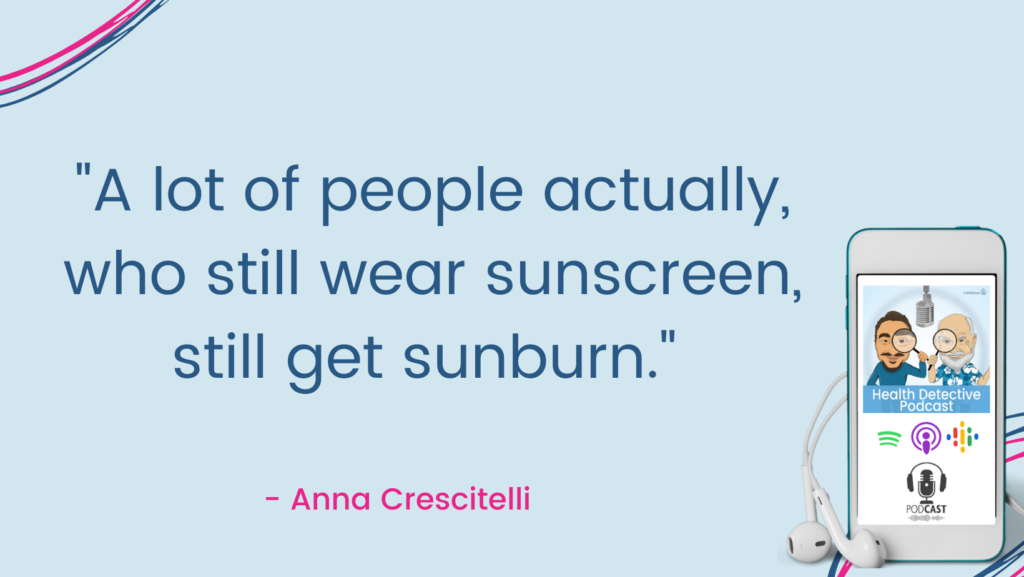
Anna: It’s interesting. A lot of people actually, who still wear sunscreen, still get sunburn. One of the problems, and this goes back to kind of natural cues from your body we were talking about earlier, kind of figuring out what your body needs. Literally your body has a mechanism built in to tell you if you’re getting too much sun, which is a sunburn. But the problem is, people are putting on all these sunscreens and they’re staying out in the sun way longer than they should ever be. I know you talk about exposing your body to light and when to start and how long to do it for, but these people don’t do that. They go out into the sun in the middle of summer and they probably don’t even live near beach or anywhere where they’re getting sun. Then they go wear a bikini and then they’re out and they have this toxic sunscreen on that’s not letting them know when they’re actually getting properly burned. It’s probably an aftermath of you’re in the sun for way too long.
Anna: Then you’re a lobster. Then you’re like, oh, well, I don’t know why I got burned.
[00:31:11] Evan: That’s really interesting cause that’s where you and I definitely mix on this. I’ll be curious, I’ll have a question about the sunscreen thing in a second, but for me, I mean, you and I are both Caucasian people, right? I mean, I get tan in the summer. You certainly get tan in the summer. The image that you described of this classic type of thing. This woman who was probably working in an office or whatever, she goes to the beach finally in the bikini. Now it’s like, I haven’t been outside all year really.

And now all of a sudden, I’m exposing myself to the strongest sun of the year at the beach. One of the issues is we’ve lost our relationship with sunlight and the transitional period. Last year during the pandemic I camped for over 60 days. I was just doing some fun stuff. I wanted to do stuff that I wanted to do anyway, but I never had the time to practically just camp outside and spend three hours outside in the morning.
And I did this in June of 2020. When I would do that, I’d be out there and I know stuff about light, so I hope it doesn’t sound too far out to anyone that’s listening. I feel like we’re all far out here. But I was just sitting out there, in my boxers. I would do normal work and I would allow that early morning light before the UVB can actually penetrate the atmosphere to hit my skin. And then what was happening was, I did have a limit on how tan I could get. It’s not like I got super tan, like someone who is actually from Africa or something like South America. I couldn’t get there. But it was unbelievable how long by the middle of that summer, I could sit out in the mid-day sun and be totally fine.
It got to the point where I just started testing it and experimenting on myself because I was like, wow. I use an app called dminder, by the way, you guys got to get that. It’s free and it will show you how much UVB is available in your area. What the UV index is at very specific times. And then you can click start and based on your skin type, which they teach you how to identify, you’ll know how long you can be out exposed to that sun.
One time I think I fell asleep or something and I was just relaxing. And I went 10 minutes over. I was like, okay, this thing used to be pretty sensitive. It would be to the minute for me. Then if I messed up a couple of minutes after that I was done, but nothing happened. I was like, then I come out the next day and I’m pushing it, pushing it, pushing it. It would have had to be multiple hours that, even though I am a Caucasian person, out there in the strongest sun, July UV index is 11 or 12 most days, and I’m just not burning.
I would just get tanner. I burn easily, usually. I would just get tanner. I felt good. It was very, kind of interesting. My question that I want to throw back at you though, is of course, there’s going to be someone initially saying, “Well, oh my God, I need the sunscreen because otherwise I’m going to get cancer”, which is ironic because you’re basically just trading a cancer for another cancer because you’re going to get that from the damn sunscreen anyway. But what is your honest advice? Because it sounds like you’re kind of resistant to the sunscreen, but I know you’re not stupid and telling people to burn either. What is your solution?
[00:34:11] Anna: I would definitely say that it’s important to start your exposure early and start it in small doses. I’ve been guilty of this as well. You get excited. You’re like, oh my gosh, the sun’s out. Then you want to go outside and you want to sit there and, you want to sit there for as long as possible cause you’re like, it feels so nice. That I would say as number one, slow, gentle exposure. What I do too is, if I start getting a little red or pink, not red, pink, I adjust. I either go in shade or I just put on a long sleeve, light cotton shirt and a hat.
[00:34:51] Evan: What a concept? Groundbreaking.

[00:34:55] Anna: Exactly. Then also I have seen a difference in even the way that I eat. If you’re eating really well, organic, high antioxidant diet that’s also high in fat, which is something that has worked so well for me. If I’m eating a really high, good, healthy, fat, non-rancid omega-six. Like when people are eating really crappy vegetable oils, not like those types of fats. I’m talking about, avocados and fish and high-quality meat and all that stuff. I just noticed that the people that are eating the really highly processed rancid diets are the ones that cannot hold a tan.
And unless it’s extremely genetic that they tan really well. I have friends that live in Jersey all year. They go to the beach all year. They don’t eat an amazing diet, but they just naturally, they’re Italian, they get super dark.
Evan: Sure.
Anna: Sometimes that happens. But for people like you and I, who are very fair, I’ve noticed that a lot of times the people that are eating the really crappy diets are not the ones that can hold the tan properly. And they’re the ones that are burning. Then you combine that with that type of sunscreen. I don’t know. It’s hard being an aesthetician because people are always like, they just drill it into you to wear sunscreen all the time. I really just don’t think it’s good. I think we’ve lost our, like you said, we’ve lost our connection to the sun. We’ve lost that. We’re afraid of it now, but it’s the thing that provides life for everyone.
[00:36:37] Evan: Sure. There’s so many things here to jump off of. People are so scared of course, like, oh, well I don’t want my skin to wrinkle. It’s like, okay, well one, if God forbid you got some wrinkles, but you got extra health benefits. I don’t know that I would make that my main priority, but that’s not even the point. The point is since people aren’t getting exposed to that early morning light and the late evening light where there’s an abundance of red light and very little to no UVB, guys, people go to dermatologists’ office right now to get red light therapy.
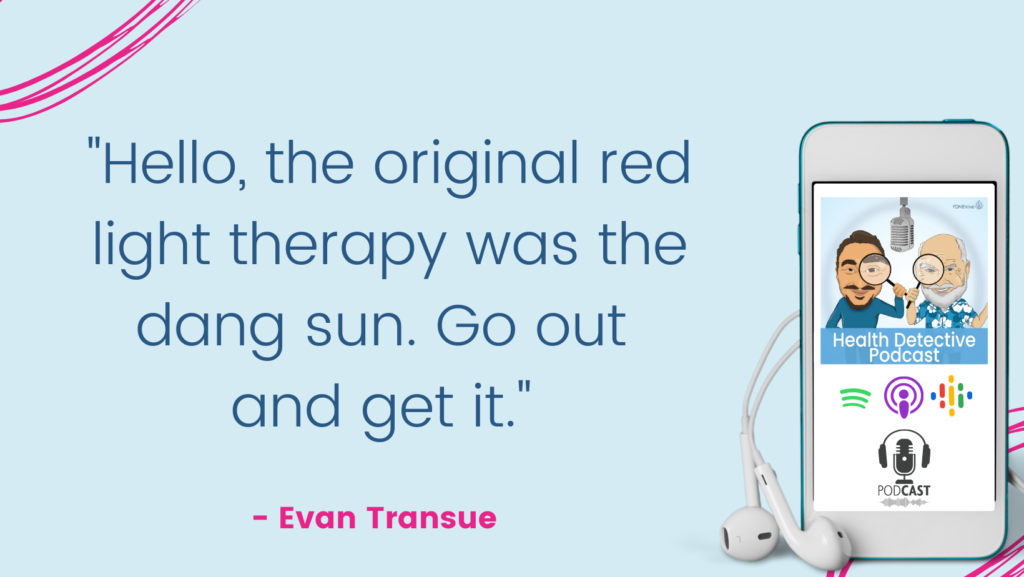
You’ve seen this probably. I know you said that you don’t have newer technologies. But this is becoming a thing in your world where people are using this. It’s like, hello, the original red-light therapy was the dang sun. Go out and get it.
[00:37:17] Anna: I saw this article the one day, it was so funny. It didn’t have any science backing it, but to me it makes so much sense. I feel like if anything, you’re fricking screens are gonna mess with your skin more. You can actually have skin problems from looking at your phone too much, or a computer screen, too much. A lot of people that sit in artificial lighting, looking at an artificial blue light screen, actually they can have a higher risk of melanoma than someone who works outside.
[00:37:46] Evan: I’m actually familiar with the study that you’re talking about. I feel like I can’t speak about it off the cuff, so I’ll be careful. But I have seen what you’re saying. I do know what you mean. I know one of the problems with blue light, in the eyes, it liberates vitamin A. Now vitamin A, as anyone in your field knows, and maybe even many listeners would know, this is so important for skin.
A lot of vitamin A derivatives are some of the most effective acne treatments that have ever existed. The Accutane. I used Tretinoin as a vitamin A derivative if I’m not mistaken. What’s the one, Retinol? Tretinoin? Is Tretinoin the brand name of Retinol.
[00:38:18] Anna: Retin A. You’re looking for Retin A.
[00:38:22] Evan: Literally the topical equivalent of Accutane, in so much as it is a vitamin A derivative, we know this works on that type of stuff. I always thought that was cool.
[00:38:33] Anna: It is interesting too, because Accutane, it’s a very synthetic version of vitamin A. That’s why there’s a lot of side effects. Too much vitamin A can do damage on the body, even though it’s good for you in certain doses. It is something you have to be careful with even natural forms of vitamin A. They always tell you, they’re like, just be careful. You don’t want too much. But yeah, I mean, people don’t know what they’re saying.

[00:38:58] Evan: And one thing that should be specified for people is it also depends on the form that it’s coming in, because if it is vitamin A, I think it’s vitamin A as Retinol. Does that make sense? If it is vitamin A as retinol, that’s when you can actually get so much of this in your body, that it can become toxic. The beta carotene, you could eat almost unlimited amounts of that and be totally fine. It’d be astronomical. I don’t even know if it’s possible. The thing is, and this is what something people need to consider. Again, not medical advice, just throwing something out there. If you eat organ meat, specifically, things like beef liver, there is enough vitamin A in that, in that form, that if you ate a couple pounds every single day, you would eventually get vitamin A toxicity.
Now, you’re also getting an abundance of other nutrients. You’re getting obviously a real food instead of a pill. That’s kind of scary and was originally introduced to the market as a freaking chemotherapeutic drug. Now we give it to pimple-faced teens because we realized one of the side effects is that, oh, well this burns out the sebaceous gland, so we should do that. That’s horrifying in so many ways. It’s so freaking wrong. At least you don’t have to sign a book-like packet basically just signing your life away before you take it. Oh wait, you do.
[00:40:10] Anna: But that’s one thing too, when it comes to skincare, even with how we talk about the light and then skin and everything we’ve talked about. Now, it’s everything is so harsh when it comes to getting rid of skin issues and even a lot of body issues, people are constantly like, “Take this. This is a harsh thing, scrub this on your face, harsh, harsh, harsh, we’ll get rid of it this way.” A lot of it needs to be very gentle, nourishing ways of doing it. That’s something I’ve found with my skin too. I think it’s the same thing with the sun. They’re making you afraid of the most natural thing.
But then you’re throwing off your circadian rhythm by looking at your blue light screens, not going out in sun and fresh air daily, which is what we need. It’s kinda crazy.
[00:40:57] Evan: Yeah. Just to be clear about what I was trying to get at before, which again, not advice, but it’s like, wow. If beef organs specifically, liver, could eventually provide similar side effects to the ones that Accutane can, except it’s natural, maybe I should give that a shot before I go try that. I would recommend that for a month or two, just to see what happens.
[00:41:22] Anna: The problem is we also do live in a very, like I said, a very quick gratification society. People don’t want to do that. I think my acne wasn’t at the point that I could do Accutane. My mom wouldn’t let me. She was like, you don’t have the cysts. I had a lot of spots, but I didn’t have cystic. It wasn’t as awful as some of my cousins had to be on Accutane and stuff like that. I mean, mine wasn’t, even at that point, I don’t really blame people either for wanting to do the thing that has been told to them, “It’s going to work.”
[00:41:59] Evan: Absolutely not. You’re thinking like, wow, 60 days, this can go away. I’m already in so much psychological pain, sometimes physical pain, depending on what the person has.
[00:42:05] Anna: Especially if there’s under the skin pustules.
[00:42:45] Evan: I want to transition because it is technically a conversation overall that’s going to include light stuff. I’d love to know just your thoughts because I got to go in for a second. One of the things that I wanted to get to is the whole, “Oh, I feel so good in the sun.”
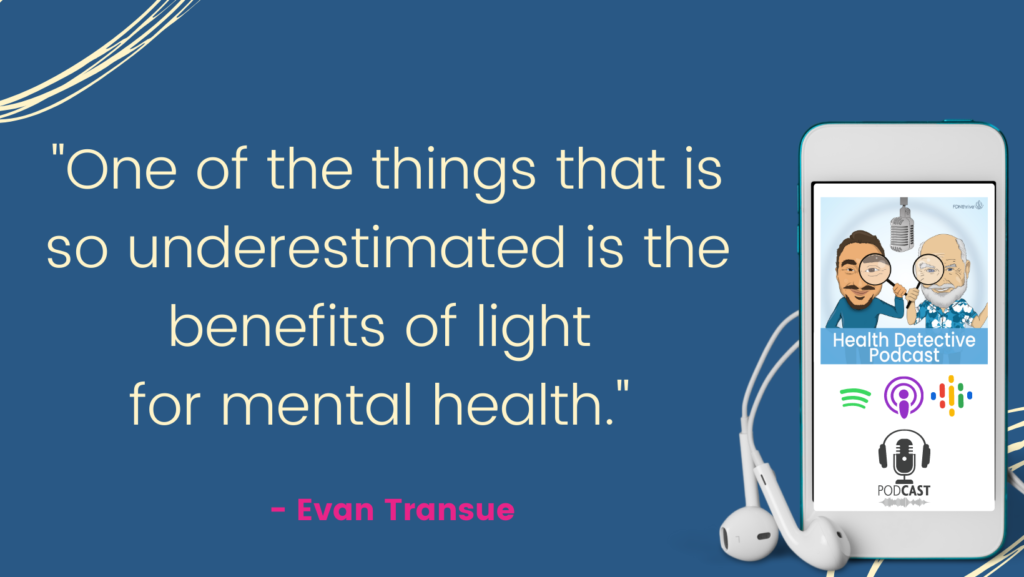
We’ve all heard that tanning beds are addictive, and I always like to explain this to people because I’m someone who is in the mental health space, as many of you guys know. One of the things that is so underestimated is the benefits of light for mental health. Now, why do we get addicted to tanning beds? Why does it feel so damn good? And that if you’re in a Northern climate, or I guess technically you could be far south as well, when that time of year finally comes out and the sun is strong, it’s the first 65, 70-degree day, but relative to what you’ve been through, it feels perfect. Even today it was like, what? 66 and sunny. It felt great. Yeah. It is the UVA light, which does not burn you or give you vitamin D. It is the UVA light that makes us feel that good because what UVA does, we’re getting a little nerdy, but it’s pretty interesting stuff, UVA, to keep this simple, basically helps make more of a protein called Proopiomelanocortin.
Now, if you’re a true biochemist, you’re gonna be like, okay, this is way too simple, then fine. You can more than welcome to comment on this show and explain it a little more. I don’t think people want the actual biochemistry of proopiomelanocortin. I don’t even know if I could fully explain it at its highest degree.
Not the point though. The point is UVA will help make more of this more or less. And proopiomelanocortin is this magic little thing, because when it is there, it actually acts as a precursor to some really important things, such as serotonin, which is going to convert to melatonin at night, such as beta-endorphins, dopamine. What is the other one I’m missing? Oh, ACTH, Adrenocorticotrophic releasing hormone, which is going to convert to cortisol. You actually want normal amounts of that. You don’t want low cortisol. That’s just as much of a problem as too high cortisol, arguably, even more so, because it would imply that your HPA axis is all messed up, but that’s the side point.

The point is, this is why we feel so good. This stuff releases the beta-endorphins. It releases the dopamine. When you’re tanning someone, it is not the UVB that tans primarily it’s mostly UVA. When you’re in a super tanner machine, high pressure, they’re called, they are isolating UVA. It’s 98% or 99% of the dang light is doing that.
You’re getting way more UVA than you ever should, first of all, which can be dangerous if you’re isolating it like that. But the other thing is, of course, you’re going to feel good. You literally are just having an abundance of dopamine and beta-endorphins. I had to throw that in at some point. I don’t have anything else to add to that.
[00:45:23] Anna: I’m curious cause you said this is specifically early morning light that you’re talking about.
[00:45:31] Evan: UVA light is going to correlate with general UV light, yes.
[00:45:35] Anna: Because the UVB, which are the burning rays, UVB, those aren’t available before a certain point in the morning, If I’m correct. You could technically lay naked in those UVA lights and sunbathe and expose your eyes to the early morning light and you won’t get burned.
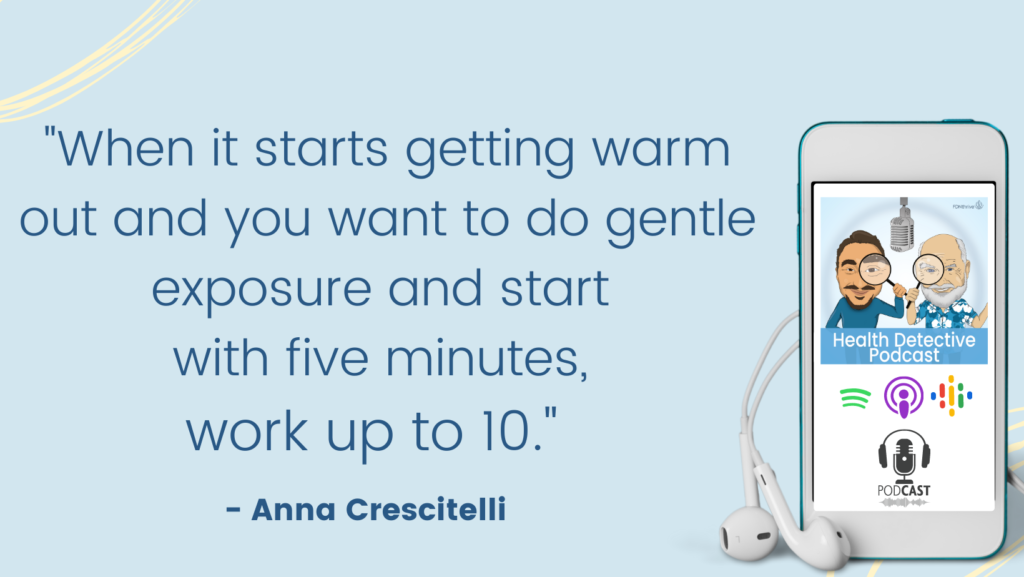
But that’s the other thing too, is when we were talking about light gentle exposure, early on, like in the spring, when it starts getting warm out and you want to do gentle exposure and start with five minutes, work up to 10. That is something that you can absolutely do during that time period when the UVA is higher than the UVB. Cause the UVB comes in more around noon? Right?

[00:46:18] Evan: There’s good questions because there’s two parts there. The UVB thing and people, I need to constantly say this, because I even forget sometimes in the functional world. I feel like it’s well known, and it’s not. Guys, you can’t get vitamin D or burn unless the UVB is present.
UVB actually comes from the sun in such minute amounts that it’s only there in meaningful amounts when the sun hits a certain angle over the horizon, this is how little we’re talking here, that the sun actually needs to be, it’s 30 degrees specifically. It needs to be 30 degrees over the horizon for UVB light to pass through the atmosphere in meaningful enough amounts to start producing something. When we’re talking 30 degrees, we’re talking a UV index of three. It’s nothing. The palest person can go on that for a little bit and be totally fine. They can probably do 30 minutes each side, at least.
[00:47:11] Anna: Well, and you can see that on the dminder app . If you go on the dminder app you can see the angle. It’ll tell you, as long as you put in your county properly and your state and everything, you can see what angle the sun is at. This morning, I was out from 10:30 to 11:30, and the UV index was at three.
And I could lay in a tank top and pants and just lay in there for like, I probably laid for 45 minutes.
[00:47:38] Anna: It could have been higher later in the day, but that’s because it was early. If you go on the dminder app, you’ll see, it says no D available until this time or D available for the next two hours.
[00:48:02] Evan: That’s the problem in today’s world. Well, sorry, not today’s world, but specifically this time of year for many people in the Northern latitudes, because after you go past the 37th parallel north, because of the angle, there is a time of year for some period of time that your area can get zero meaningful amounts of UVB because the sun will never go 30 degrees over the horizon.
Ann and I live in Southeast Pennsylvania, I think we’re at the 40th latitude. From literally, we’re going to lose it in about a week or two, from mid to late November, to all the way to late January, there is no meaningful amount of UVB that gets through the light. If you actually had the guts to go do this middle of December, it’s freezing cold and you’re laying out butt naked on a sunny day at 12 o’clock in the afternoon, you’re not getting any vitamin D. That’s not how it works.
[00:48:51] Anna: You can talk about this a little bit too because I know you’re very well versed in this, but I know for a fact, I think, that if you get enough vitamin D during the summer months when it’s really warm and the UV index is super high and the sun is hot, it actually will store itself in your fatty tissue and it’ll benefit your body into the winter months. It helps with depression. It helps with seasonal affective disorder, seasonal affective disorder, seasonal depression, mood swings, things like that, cause it’s still stabilized cause it’s a fat-soluble vitamin.
[00:49:30] Evan: Really what you’re getting at is, shouldn’t we be able to get enough vitamin D in the summer to last us the winter? The answer is yes, but… What’s your heritage?
[00:49:45] Anna: I’m Irish and Italian and German.
[00:49:49] Evan: I wouldn’t have guessed the Italian part. That’s interesting. Nonetheless, a Northern European type of thing. I’m Polish and French. We’re on a very similar, even though we’re across the world, we’re on a very similar latitude to where our ancestors were from. We are designed for actually this cycle that happens.

That’s why, it’s only been what, four weeks since the days weren’t even nice and we still get a nice day and you and I rapidly lose that tan to our skin. It is doing that as a defense mechanism. The body is recognizing, oh, wait a second. There’s not enough of this anymore. I’m going to take the melanin.
It doesn’t speak like this, obviously. I’m going to take the melanin from this person’s skin because they don’t need to be protected right now. We actually want to get as much of this as possible. By the time we’re in mid-winter, you and I get pretty darn white and that’s what’s going to happen even though I spend all summer outside.
Then of course spring comes and we’re able to adjust and get tan for that. Yes, in theory, in a perfect world, someone should be able to maintain the vitamin D status at least good enough in the winter. There are so many issues here. One, so many people are not getting outside. They have no idea what their vitamin D levels are.
[00:50:55] Anna: No, even in the summer, I feel like a lot of people, unless you’re going to the beach or you’re actively walking around outside and really laying out and spending that time. When I was 18, I had a job that I didn’t have to go in until nighttime. I would go to work at four o’clock for my shift, but I would lay out all day and I had such a deep tan, and it was the best winter I had afterward because I had so much vitamin D in my system.
[00:51:26] Evan: People get more scared when the sun’s out. Sometimes it’s actually counterproductive. Florida is one of the most vitamin D deficient states. Now I do think at least some of that probably has to do with, I feel like in general, they have an older population. So those people are probably even more scared. But number two is just the fact that it’s so hot that you don’t even think about going out without the sunscreen on and stuff like that. So, they’re never getting enough of it.
[00:52:08] Anna: It’s kind of crazy how many people, do you feel like if you were actively really focusing on being out in the sun, getting your dose of the day, do you feel like more people would be able to go outside in that heat and not burn? Really? I mean, I feel like that’s kind of the whole process. You start with slow exposure and I do get that it can be too hot til your body starts overheating. But I think if you got up early enough and you were still doing your exposure, I think it’d be fine.
Is it About Light or Heat Tolerance?
[00:52:38] Evan: Our body responds and adapts to these environmental signals. The problem is now whether it’s December or June or October or whatever, you have people that are living in the same temperature year-round. We’re in a monitored temperature room right now. It’s probably about 70 degrees. It’s going to be 70 degrees, even in June. It’s going, what are we talking maybe plus or minus two degrees and Fahrenheit for international listeners. When does my body give out? When does my body burn?
That’s all it is. That’s kind of a problem. That was the other thing I noticed. That’s really interesting that you said that because it’s not technically about light, but my heat tolerance was insane the summer when I did the camping stuff. I would for hours. I’ve lived doing this stuff for myself just to see what happened. I’d be like, I wouldn’t drink water and I’m not saying I’m being stupid with it. I’m just, when does my body give out? When does my body burn? Because we have these perceived limits that are sometimes very false. I would just notice, I’m like, dude, you’re going like crazy and still doing totally fine for hours. No problem.
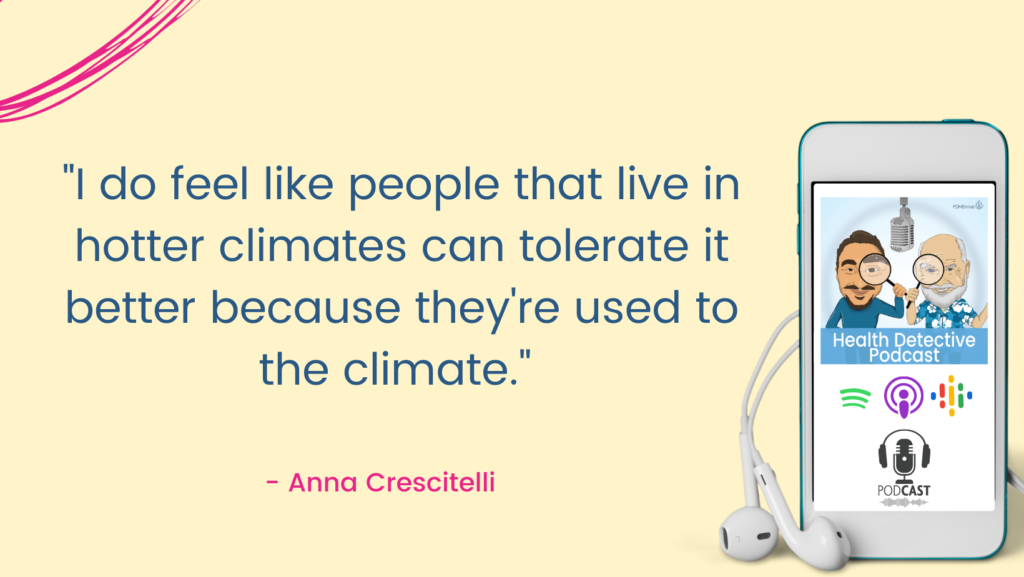
[00:53:35] Anna: I thought it would be a stupid question because I feel like, how would the way that the light affects your skin affect your heat tolerance. But I do feel like people that live in hotter climates can tolerate it better because they’re used to the climate.
[00:53:48] Evan: It’s not a stupid question because a lot of it has to do with the mitochondria. The mitochondria are the exact same reason that you watched me start doing the cold exposure stuff last year. I tried it out, but for real, I started doing it. I was like, I’m committed to this. And in summer, the place that we’re recording this right now, he offers a wide variety of things and he does ice baths.
And I came over, 90-degree day, literally 90-degree day. They have it outside even. They had just done this. Each of them got in and they do ice baths that are sub 40 all the time. They’ve done as high as 20 degrees. It’s so stupid when someone says that’s not possible.
If the water is moving, yes, it can be below 32 degrees and it doesn’t freeze, my friends. That’s not what I’m getting at.
Anna: People think that?
Evan: It’s remarkable. Like a river. “It can’t be. Because at 32 degrees, everything just instantly freezes.” There is a temperature where instant freezing happens, but I don’t know that off hand.
[00:54:44] Anna: Well, I still think there’s a difference between a smaller body of water and then an actual live river or creek that’s moving at a certain speed.
[00:54:56] Evan: I gotta look this up. What temperature does water freeze automatically? Oh wow! I would have looked so cool because I thought it was negative 40 because I’ve looked this up before, and it is negative 40 Fahrenheit.
That’s like when they have videos of this, I think from people in Canada, where you guys can look this up, it’s actually really interesting, but someone will be in a building or whatever, and they’ll take a bucket of water or a water bottle and they’ll throw it out into the air and you watch before it hits the ground, it literally just turns to these ice shards.
[00:55:39] Anna: Well, I don’t know. I’m already feeling sad that the sun is not around as much anymore here. I’m trying to go to Florida. I know you’re always go.
[00:55:49] Evan: I can’t hang with you in Florida, but I’m there for a room.
[00:55:54] Anna: I don’t do anything. I’ve never even been to the parties in Florida.
[00:55:56] Evan: You would be up all night in Miami. You got that ENFP energy. We’re in the personality type stuff. We actually had someone on here that did this before, so it’s not that weird.
Yeah, someone did the Enneagram. Renee Bergman. She’s pretty cool. She typed me live on the thing and it was kind of awkward actually. I’m really glad that we did that. Fantastic.
[00:56:15] Anna: Oh, great. Awesome. I don’t know about that stuff, so I just let you handle that part, and then I just kind of go with whatever you say.
[00:56:22] Evan: For some chance, someone out there knows about the Myers-Brigg system, Anna is the ENFP. If you actually had a dictionary or 16personalities.com, they’d put up a picture of her.
[00:56:34] Anna: I need to read my stuff then. I have no idea. I mean, you tell me things and I’ll be like, “Okay, I get it.” But I don’t really know about it. But a lot of people know about Myers-Briggs.
[00:58:06] Evan: Well, we’re almost actually wrapped up. All right. How about this? I definitely want to finalize some stuff. I know that you’ve got some cool things that you do.
Where to Find Anna
Evan: Ann’s like more coming on to be just kind, to talk, to have fun. We like doing this kind of stuff, but still, you do offer things to people. Where can people find you? What’s a good place to follow?

[00:58:22] Anna: Follow me. I do have an Instagram page. I am revamping my… it’s called Ans Plants @ansplants. I am revamping my stuff a little bit.
I do natural skincare and I try to post stuff on there, but I’ve been taking a break as all I do is work. I work two jobs, so that’s fun.
Evan: I thought it was three.
Anna: No, three was another time. I had to drop one. We’re getting a little tired. So, you can follow me on there. That’s pretty much my only thing that I really am on. I’m not much.
[00:58:57] Evan: Can people order your stuff, or no? Is that not available?
[00:58:59] Anna: In December, we’ll be back.
Evan: Oh baby, alright!
Anna: That’s what I mean by revamping. I’m hoping – my birthday is December six – so I’m hoping to relaunch my stuff on my birthday. Yeah, so it’s exciting.
[00:59:14] Evan: So, if you guys like these more conversational style podcasts, let me -I mean, there’s not a whole lot I can do about that immediately – but I think this is kind of cool.
This is fun. We do structure normally and it is effective and people like it. No doubt about it. But it is kind of interesting because so many random things were covered, that I feel like we actually got to more information, although it admittedly was kind of scattered. Some people like that, I like both. I can listen to either type of podcast. I’ll listen to a three-hour – what’s more or less – a monologue of this person talking. Then I love a good conversation as well.
I do have to ask you the signature question that we ask people on the Health Detective podcast, though. You’re not getting away without that.
[00:59:48] Anna: I didn’t know that this was a thing. I’m ready.
[00:59:51] Evan: No, that’s the whole point. I’ll tell you. The signature question on the Health Detective podcast is, if I were to give Anna a magic wand and you could get every single person in this world to do one thing for their health or not do one thing. What is the one thing you would get them to do?
[01:00:10] Anna: Hold on. Let me think for one second. If I could wave a magic wand and get everybody to do one thing for their health, what would I do?
[01:00:19] Evan: That was very similar to what kids do when they don’t know the answer to the question. I’m going to repeat it out loud just to make sure.

[01:00:33] Anna: Well, I want to make sure that I know. Oh gosh. I feel like it’s so stupid to say, but drink water. I feel like people don’t drink water. When people come to me and I asked them – we’re doing their skin consultation and everything – I’m always like, “All right. What are you doing? Like with fluid wise, you drinking water?” They’re like, “No.”
I’m like, “Oh, okay, well that is the number…” And then they tell me about how wrinkled and dehydrated their skin is. I’m just like, “Okay.”
Oh, can I do another one too?
Evan: By all means.
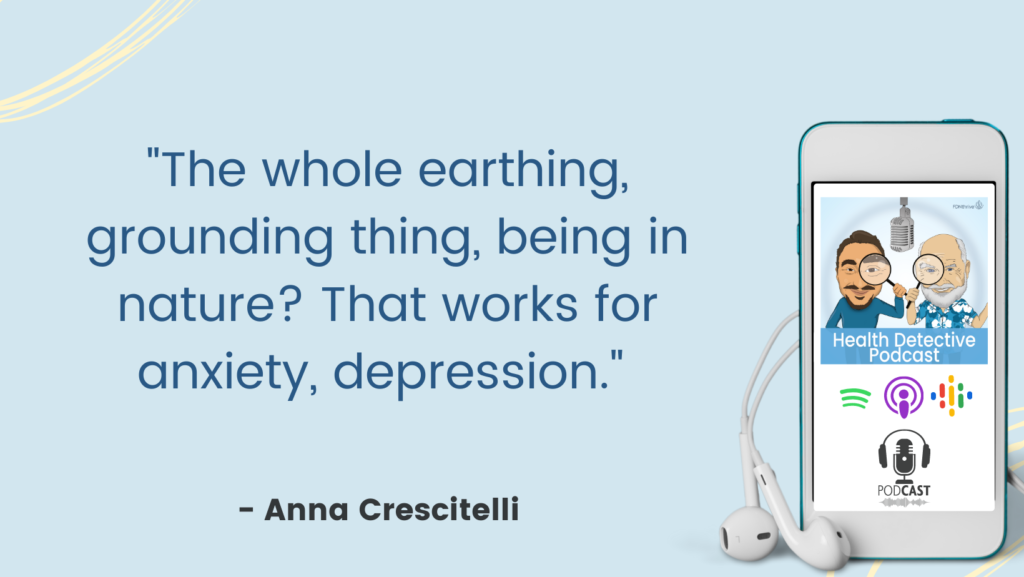
Anna: I think the whole earthing, grounding thing, being in nature? That works for anxiety, depression, at least for me, it worked for both of those things.
And I know that’s something that kind of everyone struggles with. Doing the grounding stuff, going out into nature barefoot and just standing in grass or whatever – just getting your feet on the earth – it’s so important.
[01:01:28] Evan: There’s so many people here that believe in that. I mean, you don’t have to believe in it. It is science. There is benefits to it. But I think it’s so cool that – I don’t know. This will be episode 91 or 92 – and in those episodes, not one person has answered with that one. Although one or two have answered with the water thing. Thanks for bringing us something unique, Ann. Thanks for being a part of our first live podcast.
[01:01:47] Anna: I’m excited that we got to do this cause it’s fun.
Closing
Thanks for tuning into the Health Detective podcast. If you are ready to finally work with a real health detective on your health journey so that you can get well and stay well naturally, visit us at fdnthrive.com and click the “get started here” button.
